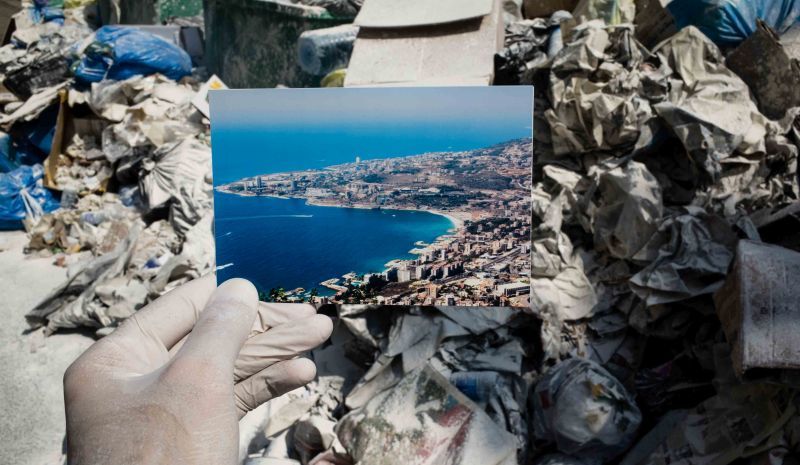Human Rights Watch: No Action to Enforce Lebanon’s New Waste Law
هيومن رايتس وتش: لم تؤخذ أية إجراءات عملية لتطبيق القانون اللبناني الجديد الخاصبالنفايات
Human rights watch/Thursday 18th October 2018
Lebanese municipalities are endangering the health of residents by openly burning waste despite the passage of a national solid waste management law banning the practice, Human Rights Watch said on Thursday. Following decades of mismanagement of solid waste, Lebanon’s parliament passed the law on September 24, 2018, during the first parliamentary session since elections in May.
Municipalities are flouting the law, which bans open dumping and burning of waste and sets penalties for violations. The law gives the Environment Ministry an oversight and monitoring role and mandates the ministry to develop a national waste management strategy within the next six months.
“Now that parliament has passed the long overdue solid waste management law, the Lebanese government needs to carry it out,” said Lama Fakih, deputy Middle East director at Human Rights Watch. “Unless violators are held accountable, Lebanese will continue to suffer devastating impacts on their health and their environment.”
Lebanon’s waste crisis gained international recognition in 2015, when garbage overflowed in the streets of Beirut. But Lebanon’s mismanagement of its waste, including by burning it at dumps, is decades-old. Human Rights Watch found in a December 2017 report that burning waste at more than 150 open dumps was risking the health of nearby residents. The practice violates Lebanon’s obligations under international law, including the government’s duties to respect, protect, and fulfill the right to health.
Human Rights Watch researchers visited two villages in south Lebanon, al-Qantara and Qabrikha, on October 11 and spoke with residents in al-Qantara who had witnessed the open burning of waste in the municipal open dumps in both villages in previous days. Media have reported that the practice continues in other towns and villages across the country.
The dump at Qabrikha was still smoking when Human Rights Watch researchers were on the site and there were clear signs of burning at the al-Qantara dump, including soot from recent burns and ash deposits. Residents said that municipal open dumps in neighboring al-Ghandoriya, Rab Thalatine, and Beni Hayyan were also still burning waste in spite of the new law, but Human Rights Watch was unable to verify these claims through site visits.
One resident said that, despite repeated requests to the head of the Qabrikha municipality about the burning over the past week, the burning persisted. “We got to a point where we can’t sleep anymore,” he said. “It [the Qabrikha dump] is continuously on fire and affecting us…The smell would get stuck in your nose. It’s a problem. My son is 6 years old, he has a cough…Two days ago, when they burned in the morning, you couldn’t see the surrounding towns.”
Scientific studies have documented the dangers that smoke from the open burning of household waste pose to human health. Children and older people are at particular risk.
Human Rights Watch interviewed the deputy head of the Qabrikha municipality, Imad Fahes, on October 12 by phone. Fahes admitted that the municipality was open burning nonrecyclable waste on a monthly basis. He said that while he was aware of the new waste management law and the penalties associated with open dumping and burning of waste, the municipality was waiting for instructions from the Jabal Amel union of municipalities on how to proceed.
“Perhaps we can adopt sanitary landfilling,” he said. “But we need expertise and to know whether it would affect groundwater. There’s also the funding issue…But the principal thing we need is instructions and technical guidance.”
Guidelines to municipalities and unions of municipalities on solid waste management were however already circulated by the Ministry of Environment in November 2017.
Human Rights Watch tried unsuccessfully multiple times to reach the head of the al-Qantara municipality but did interview an employee from the al-Qantara municipality responsible for picking up the waste. He denied that the municipality was burning trash. When researchers told him there was evidence of burning at the dump site, he said this must be from old burning at the site. But visible ash deposits and black soot at the dump, and a noticeable absence of piles of trash, suggested that this was not the case. Residents also said the burning at the al-Qantara site was continuing and one resident provided photos to Human Rights Watch taken on September 24 that appeared to show smoke from the burning of trash at the al-Qantara dump.
The Environment Ministry should urgently begin monitoring compliance with the solid waste management law and ensure that violators are appropriately penalized, Human Rights Watch said. The ministry has set up a complaints process to receive information about environmental offenses like open dumping and burning of trash, including a hotline that residents can call by dialing 1789. The cabinet should consider the ministry’s budget requests to ensure it can carry out monitoring. The government should ensure that everyone in Lebanon who suffers a violation of their right to health through action or failures by state bodies has an effective remedy.
The environmental public prosecutor in each governorate should also be adequately resourced to investigate complaints received from the Environment Ministry and others and ensure that violators are held accountable. The Justice Ministry should publish the names of the environmental public prosecutors in each governorate to facilitate the reporting of violations, Human Rights Watch said.
In January, Human Rights Watch opened a campaign calling on parliament and the cabinet to pass a waste management law and develop a strategy on waste management for the entire country and comply with environmental and public health best practices and international law. Over 12,000 people signed a petition in support of the campaign.
The new law requires the Environment Ministry to establish a national strategy within six months. In January, the cabinet passed a a summary policy on Integrated Solid Waste Management, and the environment minister formed a committee on waste management, which includes a civil society representative.
In keeping with its obligations under the new law, the Ministry of Environment should build on the summary policy by developing a long-term strategy for waste management. It will need to detail plans for reduction, sorting, collection, transfer, storage, processing, and disposal of solid waste in a manner that takes into account the perspectives of the public health and environmental experts and local communities, Human Rights Watch said.
“The next six months present an opportunity for the community to work with the Environment Ministry to build on the summary waste management strategy that was passed in January,” Fakih said. “For the long-term strategy to be effective, it should take into consideration the concerns and expertise of local communities and public health and environmental experts.”
The dump at Qabrikha is adjacent to a recycling facility. Human Rights Watch researchers visited the facility and spoke with an employee there. He said waste that was not recyclable and non-organic was returned to the municipalities whose trash was processed at the facility. He said that Qabrikha municipality moved this waste into the nearby open dump, where he saw them burn it. He said trash at this dump included plastic bags and diapers. Human Rights Watch researchers also observed clothes and other household waste at the dump. Qabrikha is in the Wadi Hujeir Nature Preserve.
Residents could not specify when burning at the dumps began but estimated that it had been going on for years and said that burning in the past week had been particularly intense.
One woman who moved to al-Qantara in May 2017 said the municipalities have been burning the al-Qantara and Qabrikha open dumps since she arrived:
We can’t breathe at night. The smoke builds up and it moves towards us like fog. I can’t recover from the flu…There’s smoke every day. And the smell is strong at night. It’s the smell of nylon, it’s heavy and odd, something you can’t handle. I didn’t see a doctor or pharmacist regarding the symptoms. I take medicine for blood pressure and diabetes, why add to all this? I drink tea with lemon… The maximum I can do is close the windows, what more can I do?… And not just me, others, even my grandsons, they’re always sick.
Another woman, who has lived in al-Qantara for two and a half years with her husband, said:
The smell of trash, the burning, it’s unbearable. Especially the 2-3 days we went through last week…The smell is usually from Qabrikha…The latest incident was 3 or 4 days ago. I woke up at night suffocating. Smoke was filling the house. This is a village. There’s no pollution. Why would we have to wake up feeling like this? It was from Rab Thalatine. I knew because of the direction of the wind, which was from the east…The smoke smelled like trash… The main symptom was difficulty breathing and chest pressure…My husband had a surgery in the lungs. This smoke isn’t good for him. And of course he was irritated. He had difficulty breathing.
An older man also described his symptoms during the trash burning: “The symptoms are usually difficulty breathing. And some symptoms the next day, like black phlegm, from all the polluted air that gets into you. I experience this only when the burning takes place, otherwise no.”























